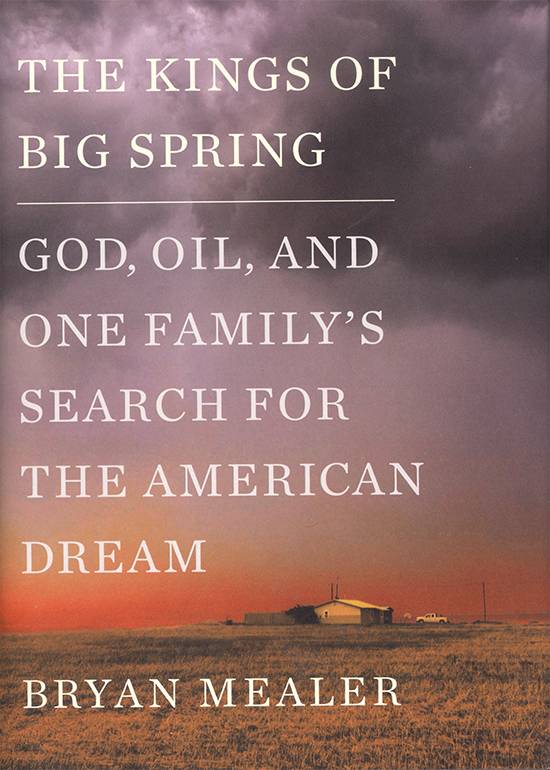
The Kings of Big Spring:
God, Oil and One Man’s Search for the American Dream
by Bryan Mealer
New York: Flatiron Books, 2018.
369 pp. $27.99 cloth.
Reviewed by
Joseph McDade
“The struggles of this extended family are told within that familiar Texas history of boom and bust, cotton and oil, flood and drought, boll weevil and booze. The family endures what becomes known as the “Mealer Luck”: a series of misfortunes both personal and region-wide.”
As in many family chronicles, the cast of characters found in Bryan Mealer’s The Kings of Big Spring: God, Oil, and One Family’s Search for The American Dream is opulent and sprawling, requiring a series of introductions to an extended tribe during a raucous wedding reception. The reader has to keep flipping back to a (mercifully included) family tree to discern among various Mealers—Robert, Bob, Bobby, Bud, and Bryan—and attempting to remember which one of them married Opal (Bob Mealer did, and he married Opal Wilkerson, not her sister-in-law, Opal Clark). Bud Mealer was the one who loved both his children and Lum And Abner on the radio until the dirt and dust of West Texas infected his lungs and sent him to an early grave. Bud’s widow Bertha fell into a deep depression, but then roused herself enough to marry Virgil, who ran off. And so on.
Advice to the reader: Go with it.
Amid this storm surge of characters and incidents one keeps returning to Mealer’s marvelous voice, as he recounts a hundred years’ worth of family history based mostly in and around the Permian Basin section of Texas, with incidents extending back to Georgia and forward to California. There is the time the late Bud’s favorite little girl, Frances, traveled with her husband, Howard, all the way to San Francisco, just to discover her mother Bertha working at a bar called This Is It. Soon afterward Howard and Frances divorced, and Frances went over to Oakland to hear her favorite orchestra, Bob Wills and His Texas Playboys, whereupon she met the new steel player, Les Anderson. After the show, Frances was standing on the dance floor, waiting for one of her girlfriends, when Anderson appeared behind her. They ended up talking for an hour and he asked her out. Those blue eyes were beckoning her—to romance, to new adventure on the road, to a chance to live inside that music.
Frances told him yes, then let herself go.
And so on.
The struggles of this extended family are told within that familiar Texas history of boom and bust, cotton and oil, flood and drought, boll weevil and booze. The family endures what becomes known as the “Mealer Luck”: a series of misfortunes both personal and region-wide. One Mealer arrives home from work to find his house burned to the ground, and no one has any idea how it happened. Religion is either a salvation or a burden, sometimes both at once, in parts of three centuries. The extended drought of the 1950s is described in such excruciating detail the reader might want to fetch a glass of iced tea just to get through it.
Throughout, we witness the personal struggles of a family: a Mealer child without enough to eat, or a whiskey-soaked husband finding midnight temperance from a preacher and a Salvation Army band that just happened to march by his spot on the curb. Interspersed with these moments, Mealer gives us the historical context, and (for instance) treats us to the story of Joshua S. Cosden, one of the early Texas oil barons, who in a decade went from sleeping in a tornado shelter to being worth between $50 and $75 million. Like Jay Gatsby, he bought a castle on Long Island and entertained neighbors such as “Vincent Astor, the Guggenheims, and the Whitneys.” Soon enough, Texas being Texas, he lost his entire fortune. Soon thereafter, Texas being Texas, he made another one.
Speaking of fortunes: we know from the book’s prologue we are eventually headed to the early 1980s, to the days of a worldwide spike in oil prices, when the author’s father Bobby was lured from Houston to (inevitably) the Permian Basin by a childhood friend named Grady Cunningham, a bigger-than-life character whose spendthrift ways would have embarrassed Joshua Cosden—or J.R. Ewing, for that matter. This is where Bryan Mealer the narrator becomes young Bryan Mealer the character, a son who witnesses his father and Uncle Grady transformed by wealth in a way that can only portend a fall:
A morning trip to the Guinn lease turned into three days in San Angelo, spent mostly in the hotel bar with eight of the boys and whoever happened past. They must have gone through a case of whiskey, and one of those nights Grady kept trying to buy the marble statue in the hotel lobby. Or was that in Midland? . . . A weekend ski trip to Ruidoso had turned into . . . how many days? He couldn’t say.
Well, how do stories like that always end? Inevitably, with Daddy and Uncle Grady, gravity intervenes. Oil gushes forth from Texas, from Alaska, from the Middle East. The price of crude plummets. One bounced check, one missed balloon payment, and before anyone can turn around Uncle Grady’s empire is in ruins. This time, though, the “Mealer Luck” has a happy, if ironic, twist. Bobby Mealer—Daddy—escapes the poorhouse by moving from oil to real estate and collecting commissions on the area’s defaulted properties, once the banks and the FDIC come calling. His son Bryan goes on to the University of Texas and, full circle, becomes a writer.
One suspects Bryan Mealer has accumulated enough material for ten volumes of this book’s length and has chosen to share with us only the choicest family anecdotes. The Kings of Big Spring, in the best sense, overwhelms us. The great good luck, in this case, is ours.
Joseph McDade is a Professor of English Literature at Houston Community College.
